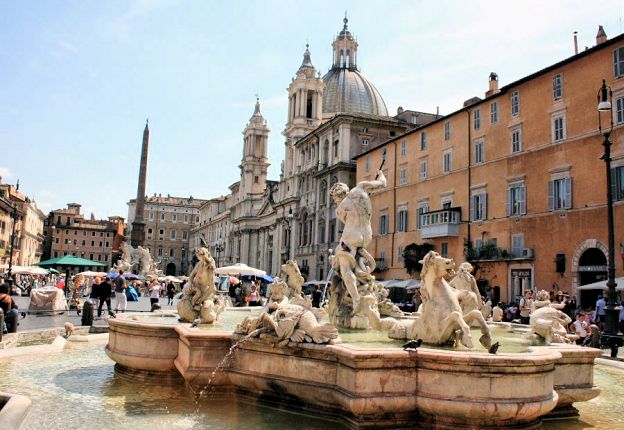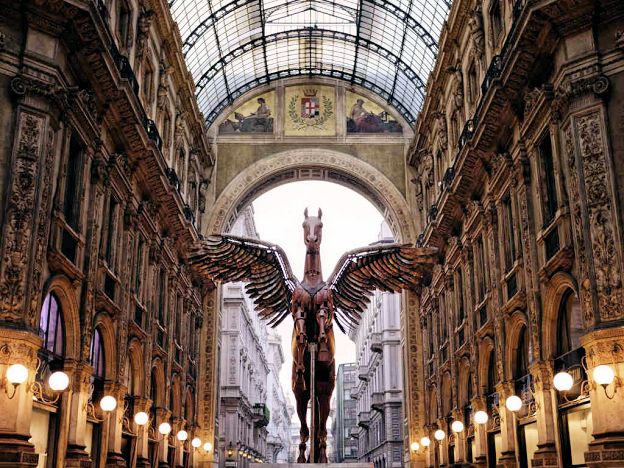
English and Italian languages, an article that shows the reciprocal influences and contaminations between the two idioms, with a particular focus on the Italian language and culture.
The Italian language is truly “infested” with English words, which have now entered common use. But even staunch “purists” should remember that 60% of the Anglo-Saxon language has its origins on this side of the Alps.
Very often we hear Italians lamenting about the great number of English words in their vocabulary. Many people don’t like the mass media’s insistence on using such words as bestseller, look, personal and lotion , and they often ridicule their elitist friends when they hear them attempting to pronounce the latest “in” English words. In England one reads the same story in letters to The Times and The Telegraph , denouncing foreign words and expressions, particularly “A-mericanisms,” as intrusions on the purity of the English language.
People who make such criticisms should realise, however, that one of the reasons why English is so rich in vocabulary is because it has borrowed so many words from other languages. An Italian using the words yacht, bungalow and robot might well be forgiven for thinking that these words are English, when their true origins are in fact Dutch, Hindi and Czechoslovakian.
Many words which Italian has borrowed from English are of Latin origin: camping, design, dispenser, leasing, privacy, schedule, sport and jeans are corruptions of campus, signum, pendo, laxus, privo, scedo, porto and Janua (Genoa) respectively. It was not, however, Genoa’s own Christopher Columbus who brought jeans to the shores of the New World; rather, it was Levi Strauss.

The first invasion of England, after the Celts had settled there, was indeed by the Latin-speaking Romans. Yet their linguistic influence was small and was limited to place names, e.g. Manchester (Latin castra). There was a stronger Latin influence when Christianity arrived under the auspices of St. Augustine in 597 A.D.: a host of Latin ecclesiastical words were introduced and the majority of religious words in English have Latin roots.
Later, after the Norman Conquest of 1066, the originally Anglo-Saxon language had to withstand 300 years of French rule and take third place to French (the language of administration) and Latin (the language of the church). Probably the greatest Italian influence came with the Renaissance, during which the enthusiastic English borrowed as many Italian, Latin and Greek words as they could lay their hands on.
In Shakespeare‘s day, for example, Signior was a common term of address in England. In this period Italy was a major center of culture, art, and learning. Many English writers and scholars, such as Geoffrey Chaucer and John Milton, were influenced by Italian literature, philosophy, and art. They often borrowed words and ideas from Italian works, which contributed to the enrichment of the English language.
The English scholars and authors so discovered the great Italian literature, particularly the works of Dante Alighieri (author of “The Divine Comedy”), Petrarch, and Boccaccio, had a profound impact on English literature. Translations and adaptations of these works introduced Italian words and expressions into English. For example, the word “sonnet” comes from the Italian “sonetto.”
So, the Italian language and culture have had a significant influence on the English language over the centuries. This influence can be traced back to various historical, cultural, and linguistic interactions. Here are some key ways in which Italian has impacted English. We can think of Musical and Art Terminology for instance. Italian has been the language of classical music and art for centuries. Terms like “allegro,” “fortissimo,” “soprano,” “piano,” and “crescendo” are just a few examples of Italian words used in music notation and art descriptions.
We can also refer to scientific and medical terms. Italian has also contributed to English in the fields of science and medicine. For instance, the word “quarantine” comes from the Italian “quarantina,” referring to a 40-day isolation period during the Black Death. Additionally, various anatomical terms, like “femur” and “cornea,” have Italian origins.

Then we have the influence on art and architecture: Italian art and architecture styles, such as Renaissance and Baroque, have influenced English architecture and design. This influence is evident in the design of buildings, sculptures, and paintings. Italy has also left its mark on English through geographical names. The names of Italian cities and regions, such as Venice, Florence, Tuscany, and Sicily, have been adopted into English.
Furthermore we must not forget the world of fashion and esign, in fact Italy is known for its fashion and design industries, and many Italian fashion brands and design concepts have made their way into English terminology. Words like “couture,” “prêt-à-porter,” and “fashionista” are examples of Italian fashion-related terms used in English.
If you read through an English dictionary you will find hubdreds of Italian words. Amongst the more general are: fiasco, graffiti, gusto, imbroglio, mafia, influenza (or “flu”) and stiletto; from architecture and art come fresco, loggia and chiaroscuro; from music we have adagio, opera and pianoforte ; and more recently there has been a deluge of culinary words such as broccoli, espresso, lasagna, ravioli, spaghetti and, of course, pizza.
The story is told of the little American boy who saw a pizzeria on his first trip to Italy and exclaimed: “Look Daddy! They have pizzas in Italy too!” This just goes to illustrate how quickly foreign words are absorbed into a language, so that they soon seem to belong at that language. Italian cuisine therefore has had a substantial influence on English culinary vocabulary. Words like “pasta,” “pizza,” “espresso,” “cappuccino,” and “lasagna” are widely used in English to describe Italian dishes and beverages.
Try telling the average English person that very “English” sounding words like attack, cash and racket have Italian roots and he probably won’t believe you. Having absorbed so many foreign words, it is only natural that English, now spoken by nearly 450 million people as a first language, should begin to exert its own influence on other languages. Beyond specific words, Italian has also influenced English grammar and syntax to some extent. For instance, the use of the definite article “the” in English was influenced by Italian usage.
It’s important to note that while Italian has influenced English in various ways, English has also influenced Italian, especially in the realm of technology, business, and modern terminology. Language is continually evolving through cultural exchange, and the Italian-English linguistic connection is a testament to the rich tapestry of language development.

Italian has taken over English words in four main ways. First, there is the direct borrowing of words to describe an object or idea for which there was no existing equivalent: club, disc-jockey, flash, hi-fi, know-how, punk, stuntman, test etc. Second, there is the adoption of an English word with an Italianisation of the spelling. This is generally a positive thing to do as it helps to indicate the new word’s pronunciation: the best examples of this are bistecca, boicottare, dribblare, gol, rosbif, sniffare and to-stare. Third, there is the borrowing of a word from English with the subsequent translation into Italian: grattacielo (sky-scraper), guerra fredda (cold war), lavaggio del cervello (brainwashing) and pagine gialle (yellow pages). Lastly there is the tendency to take words from English and use them in a totally different context: golf is only a game in English, pullmans are special trains and spiders are merely insects.
On the whole then, Italians should not regret the presence of English/American words in their vocabulary. The benefits to English from Latin words have been considerable. They have undoubtedly helped to create one of the most expressive languages in the world, giving it an enormous choice of words with subtle shades of meaning, from the warm, colloquial, down to earth Anglo-Saxon elements (hug, childish, luck) to the more refined Latin ones (embrace, juvenile, fortune).
A language needs to grow and it must adapt to changes. If events dictate that English/American is becoming the international language of the future (of commerce, cinema, music, science, sport and technology), Italians can at least console themselves with the fact that English is already full of Italian words and they should welcome, within reason, English words adopted by their own language.
You can also read:
Made in Italy, or Italy in brief
John Florio and William Shakespeare

